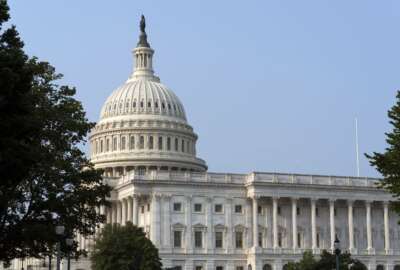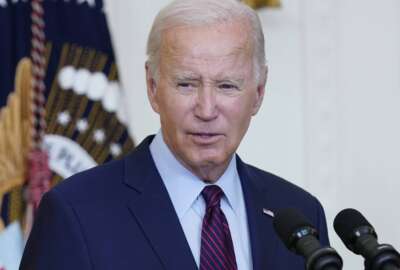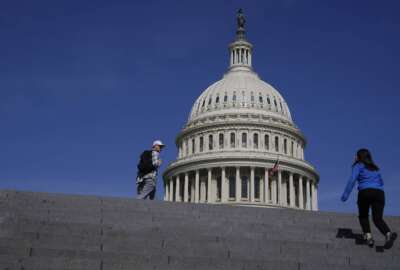
Congress shoves that budget boulder uphill one inch at a time
With government shutdown on everyone's mind, the Senate this week is trying to fashion a package of three bills. This as the House seems to be at war with itself.
With government shutdown on everyone’s mind, the Senate this week is trying to fashion a package of three bills. This as the House seems to be at war with itself. Well, one of the party’s, at least. For a Capitol Hill update, Federal Drive with Tom Temin spoke with Loren Duggan, Bloomberg Government Deputy News Director.
Interview Transcript:
Tom Temin And so the Senate is the one where the action is right now actually with a little bit of progress toward a budget.
Loren Duggan They’ve made a little progress. They spent most of last week trying to get on to this three bill package of spending measures. And now they’ll spend this week on it discussing the bills themselves and then amendments that they want to make to them. That’s the first three that have hit the floor during this fiscal year for the Senate. And the House at this point has passed one and has struggled to get any others on the floor. The big standoff last week was whether or not to bring up the defense spending bill. They went to the Rules Committee, teed it up, and then stopped going any further with it. So we’ll be watching this week to see if the House can get back on track with that measure or some of the other measures. And those would be the full year bills that would tackle everything between now and September 30th of 2024. But we are also tracking what’s going to happen in the short term because barring some magical agreement, something has to happen by September 30th to avert a government shutdown.
Tom Temin So for a faction of the House to go along with anything, what is it they want out of this? That 1% reduction from 2023 levels?
Loren Duggan Well, that’s something that would occur automatically under the debt limit deal. The provision there is if you still have a C.R. going in past January 1, that there would be a 1% reduction in the spending caps. But there are there’s a lot of different things cooking out there. And in this recipe that might get them from here to some sort of stopgap spending is evolving as it was last week. You know, there’s discussions about what to do about the Ukraine aid that the president has asked for, that Democrats are behind that. Senate Republicans and some House Republicans are behind as well. But Ukraine funding is a sticking point. Disaster aid, there’s more consensus about doing something around that, but it’s going to need a vehicle. And then there’s a lot of interest still in border security provisions and maybe pairing some of the funding with that. So how you kind of thread the needle with those different demands and those different needs might be key between here and there. And some people may not want to vote for a C.R. under any circumstance. If there’s more than four of those, then Kevin McCarthy’s problem gets pretty acute, right?
Tom Temin And he has to give up that nice wooden hammer or something, if they can get what they want. That anti, you know, faction there. I guess the visit impending by the president of Ukraine is well timed.
Loren Duggan Absolutely. He’s flying into the U.S. primarily to go to the General Assembly. But our understanding is it’s going to come down to Washington as well and meet with members of Congress. So he’ll probably make a very in-person plea to them for more assistance. I think it was about $24 billion that was asked for over the recess by the president, and that is what’s at stake right now. But if they get to that defense appropriations bill, there was an amendment that was made in order by Matt Gaetz to stop assistance to Ukraine. So, you know, there’s a lot to work through there. Those personal appeals have worked in the past. We saw him come to Capitol Hill before. So it’s something to watch for sure this week.
Tom Temin Is there any movement on the National Defense Authorization Act where in the House there is that hold on the whole thing over the social issues. We’ve talked about funding for abortion, travel and so on. And then there’s the hold on military officers. This is beginning to be like a broken record here.
Loren Duggan Yes, well, the NDAA has gotten through both the House and the Senate and could go to a conference or at least informal talks at any point now. But what you said is correct. The part of it, that’s the core defense authorization bill. How much to authorize in total, they’re almost aligned. And you could see the classic puts and takes when it comes to some of the other programs that the Defense Department oversees. But the sticking point really may be the social issues that were in the House bill that took it from a bill that came out of committee with very bipartisan backing, to a bill that was passed by the House with on a very much party line vote. So we’ll be watching that closely. That’s a little bit more behind the scenes. That legislation is more of an end of the year necessity than September 30th. It would be nice to have it in place, but a lot of those authorities are on more of a calendar year. So will be again, watching that one very closely. But the social issues in that bill are also some of the things that are going to make spending talks harder because all of the House spending bills have those. While the Senate went a very much more bipartisan approach in writing their 12 appropriations bills.
Tom Temin We’re speaking with Loren Duggan. He is deputy news director at Bloomberg Government. And there are some other issues Congress is dealing with, including something that probably affects some regulatory agencies, probably the TSA, if nothing else, if it goes through a pipeline. But that is the restrictions on liquid natural gas are coming up. What’s going on there?
Loren Duggan Well, the House is going to take up a bill this week while they work behind the scenes on the spending issues to lift restrictions in law on the import and export of liquefied natural gas. So this is part of Republicans wanting to unleash more traditional sources of energy. They pushed back, obviously on some of the approaches that Democrats took, especially in their reconciliation bill from 2022 that had a lot of green funds in it. But this is, you know, their approach to try and open up more energy business basically for the United States by importing and exporting that. So that’s one of the measures we’ll see on the House floor this week. In addition to, you know, the talks that we’re monitoring so closely.
Tom Temin And there’s a package of health bills that might be of interest to the government coming up there, too.
Loren Duggan That’s right. This is a package that three key House committees have worked together on, the Energy and Commerce, Education and the Workforce and Ways and Means Committee all share health care oversight. And they’ve worked on some proposals to reauthorize some expiring programs. One of the biggest is for community health centers, but it also has provisions on drug pricing, which have obviously been of interest and pharmacy benefit managers, which I think you and I have talked about. And if you turn on a streaming service or or watch TV, you get a lot of ads about them and their role in the pharmacy and medicine processes.
Tom Temin Yeah, there’s more ads on that than there have been since Hillarycare. You remember that.
Loren Duggan Right, exactly. And there’s some bipartisan consensus on doing something. The companies themselves have pushed back and said some of the things that have been talked about in Congress would be harmful. But Congress is moving forward with at least a few things in this package. We’re looking for a House vote on that as soon as this week, and then we’ll see what they can do in the Senate. These are some of the extender provisions that could ride along somewhere else that the the longer term deals aren’t ready. But much like, you know, FAA and Farm Bill and other programs that are coming up for renewal, that kind of forces Congress to act and write some bills around that.
Tom Temin All right. And interestingly, telework came up in the House last week. And what was interesting is that there is not this unanimous Republicans want everybody back in the office all the time versus the Democrats. Go telework all you want. There’s seems to be bipartisan realization that, guess what, before the pandemic, there was a lot of telework already.
Loren Duggan Right. So I think that there’s a push to have agencies at the very least reexamine what their policies are, how they want to approach things. Telework existed, and some of the language that’s been brought up before is return to your pre-pandemic telework stance. What were your plan in 2019? Maybe re adopt those. So we’ll see if there’s any language in spending bills that get signed into law that deal with this. Obviously there’s with any workforce issue, there’s union issues to deal with and what agreements do you have. But there is there have been bipartisan calls for a return to the office from President of the United States, D.C. Mayor Muriel Bowser, who want to see more people downtown and stimulating the economy there. And obviously, folks on Capitol Hill as well are looking for for some sort of path forward on that. So we’ll see if this results in anything. But it was a chance to air some of these ideas that people have, questions that people have about the current telework policies.
Tom Temin Who knows? Maybe the food trucks could come back someday.
Loren Duggan We miss those some days, don’t we?
Copyright © 2025 Federal News Network. All rights reserved. This website is not intended for users located within the European Economic Area.
Tom Temin is host of the Federal Drive and has been providing insight on federal technology and management issues for more than 30 years.
Follow @tteminWFED





